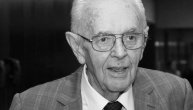EXCLUSIVE! Serbian woman working on "The Last Dance": Kukoc, critics - wait till you see episode 10
The producer from Serbia is among the most deserving for making this series that is fascinating to basketball fans
If you followed the series "The Last Dance" with fanatical attention, you certainly didn't miss the name of Nina Krstic, who carried a large portion of the story about Michael Jordan and the famous generation of Chicago Bulls.
Although not much is known about Nina in Serbia, America has already gotten to know her well through "O.J: Made in America" - a series that won an Oscar as the best documentary at the 89th Academy Awards.
This feature-length documentary premiered in 2016 at the Sundance festival, and was later broadcast on ESPN, lasting as long as 7 hours and 47 minutes - and a similar endeavor followed with the series "The Last Dance."
Nina already has a lot of experience under her belt, her literature studies prepared her to be a good storyteller, and that, combined with a master's degree in documentary filmmaking has brought about a valuable testimony about one of the most impressive generations and teams in the history of basketball.
Exclusively for Telegraf, Nina revealed some details from the filming and announced a touching moment dedicated to Jerry Krause in the last, 10th episode. Eight episodes have been released so far, the last two will be broadcast on May 18. In the production team, Nina stands alongside Jason Hehir, the main creator of the series.
For starters, maybe to introduce your work to the public in Serbia - among the more impressive achievements are 99% and O.J.: Made in America, now it's the turn of The Last Dance. What was your career path to this achievement about Jordan and the cult Bulls?
- Working on documentaries for the last 15 years, I tried my hand at everything. For a while I was director of photography, I worked as a director, and of course as a producer. But I always go back to the same kind of film - and that is film told mostly through archival footage. Directing archival films like O.J.: Made in America and The Last Dance for me is a perfect combination of visual creativity of a director of photography and a director, as well as that persistent practicality of a producer.
What left the strongest impression on you during your work on the film, and are you a basketball fanatic, to whom all this brought additional appeal?
- I'm not a big basketball fan, although I was a big Bulls fan during the 90s. I grew up watching them. Making this film left a double impact on me. First of all, Michael Jordan really was that good - it's not exaggerated in our memories. Secondly, in a documentary we usually say 'this story has a time and a place', but I'm under the impression that Michael Jordan's story is timeless. It could have been different, but it would certainly be a story of greatness and value.
The scenes in which we saw European moments, Loncar and Tarlac, were also impressive for Serbian basketball fans - were those down to you as well?
- I wish I could say that they were, but the credit for that goes to my team. Everyone on my team has a lot of knowledge about basketball, not only about NBA basketball, but also about European basketball. They taught me many things I didn’t know!
Is there anything that was especially hard to cut out of thoese 10 episodes?
- There are always phenomenal stories that have to be shortened or cut during editing to a certain extent. Fortunately, when you work on a longer series, the amount of cut scenes is not as big as it can be. We just finished the tenth episode, although I have not yet had the opportunity to step back from the film and see it from a different perspective, so that I can answer this question. Ask me again in a few months!
How did you react to criticism, like that by Toni Kukoc, regarding Jerry Krause?
- Honestly, I don't pay much attention to criticism. There will always be criticism, and believe me, we who make documentaries are the sharpest critics of ourselves. Toni's reaction comes from his experience, which is quite fair. All we can do is show as many different opinions of different people in the film. There is no one right point of view. I will only say one thing, and that is that people should refrain from criticism until they have watched all the 10 episodes. Krause has his moment at the end.
How difficult was it to adequately present the story of Krause - precisely due to the fact that he is no longer alive, but the tension between him and Jordan and Pippen was inevitable?
- We did our best to find all the interviews in which Krause spoke while he was alive. We wanted to show him in his own voice as much as possible, instead of just showing other people talking about him. We dug through the archive footage for almost a year and managed to find over 20 hours of interviews with Krause, including podcasts. Of course, we had to give the floor to Pippen and Jordan, to make it fair.
Which detail of the story is your favorite?
- I think the highlight of the seventh episode and the way we see Jordan turning defeat into power is the most touching moment in the series. Watching (and listening to) him crying on the floor after winning the championship on Father’s Day is an unforgettable moment.
Did you have the opportunity to talk to Jordan about Serbia/Yugoslavia and our basketball?
- Unfortunately not yet, but if we ever get out of quarantine and have the opportunity to hold a party on the occasion of the premiere, I will do just that.
Do you plan to continue with similar series, or possibly include our basketball legends in the US?
- I think that documentary series are a new "it" genre, so I will most likely continue with this format. However, I hope to turn my attention to something other than sports, at least for a while!
(B. Vinulovic)

